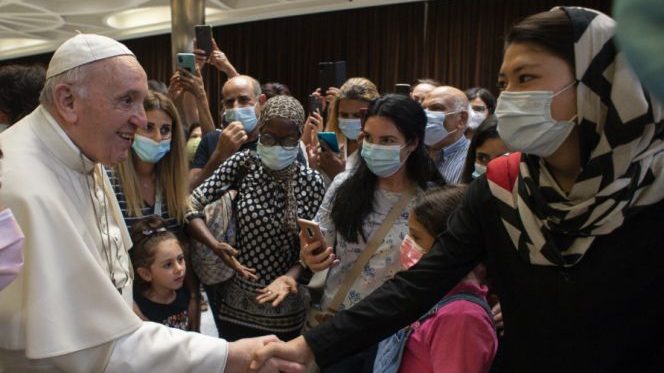Pope Francis met with recent arrivals from Afghanistan on Monday evening after a documentary about his life and teaching was screened at the Vatican.
The Holy See press office said that the pope arrived in the atrium of the Paul VI Audience Hall on Sept. 6 at the end of a showing of the film “Francesco” to greet around 100 people exiting the screening.
“Among them were about 20 people who had arrived from Afghanistan in recent weeks, to whom the pope addressed words of affection and comfort,” the press office said.
Vatican News reported that the refugees, who fled the chaos of Kabul airport, included four brothers and sisters between 14 and 20 years of age, who arrived in Italy with help from the Community of Sant’Egidio. It added that the siblings were forced to leave behind their parents who were trapped in refugee camps in Iran.
The screening was arranged by the film’s Israeli-American director, Evgeny Afineevsky, and the Laudato Si’ Foundation.
The documentary sparked headlines worldwide when it was premiered in Rome in October 2020 as the film included comments by the pope endorsing the passage of civil union laws for same-sex couples. A CNA analysis concluded that the comments were heavily edited.
Following global media coverage, the Vatican’s Secretary of State asked papal representatives to share with bishops some clarifications regarding the pope’s comments.
The clarifications explained that the pope’s remarks did not pertain to Catholic doctrine regarding the nature of marriage as a union between one man and one woman, but to provisions of civil law.
Vatican News said that Afineevsky spoke to those gathered for the screening, recalling his own family’s migratory journey from Russia to Israel to the United States.
Afineevsky told the online news site Deadline: “When the movie finished [the pope] was downstairs waiting for them. He wanted to meet everybody and greet everybody…”
“He is a human being who cherishes being close to the people, cherishes the moment he can spread love, joy in their lives -- not easy lives. And he always remembers that he can be in their place [as a refugee]. He said it many, many times: ‘It can be you or me.’”
Afineevsky added: “He’s somebody who is trying to bring light to their plight. He’s trying to bring the spotlight of the media towards them and to show to the world how important it is to help them, integrate them.”
After greeting those who attended the screening, the pope returned to his residence, the Casa Santa Marta, and the event’s organizers distributed food parcels to the guests.
After his Sunday Angelus on Sept. 5, Pope Francis urged countries to offer refuge to people fleeing Afghanistan following the Taliban takeover and withdrawal of U.S. and other forces.
“In these troubled times that see Afghans seeking refuge, I pray for the most vulnerable among them. I pray that many countries will welcome and protect those seeking a new life. I pray also for the internally displaced persons and that they may receive assistance and the necessary protection,” the pope said.
“May young Afghans receive education, an essential good for human development. And may all Afghans, whether at home, in transit, or in host countries, live with dignity, in peace and fraternity with their neighbors.”

